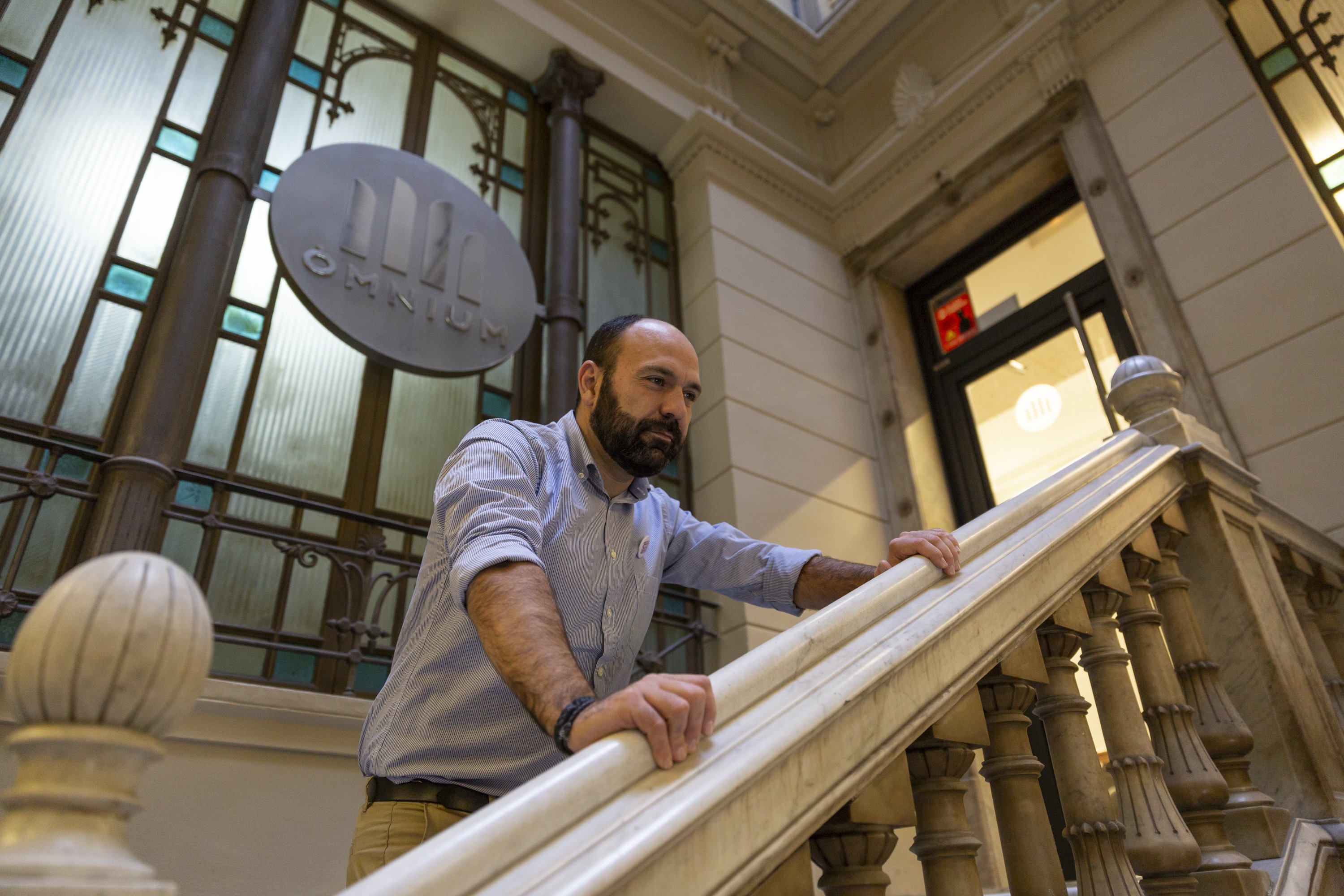Jordi Cuixart has been in prison for more than 400 days, and for the same length of time, Marcel Mauri (Badalona, 1977) has been at the helm of Òmnium Cultural, responding to necessity after leader Cuixart was imprisoned. In this interview with El Nacional, the vice president of the Catalan pro-independence civil group explains that the entity will set in motion an “intensive” national and international campaign to denounce the “farce” of the Catalan referendum trial - for which he says he can already see the verdict. Because of that, he is convinced that the European Court of Human Rights in Strasbourg will have to once again put the Spanish state in its place. In the last week, the World Organisation Against Torture (OMCT) has called for the liberation of the jailed Jordis - Jordi Cuixart of Ómnium, along with Jordi Sànchez, of the Catalan National Assembly (ANC).
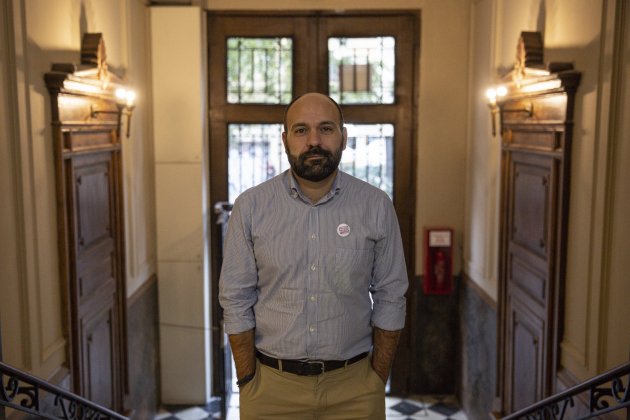
A manifesto has just been presented for a new platform called Som el 80% - 'We are the 80%' [link in Catalan]. It's signed by people from very different parts of the independence movement, such as Pau Llonch and Pilar Rahola. That has a lot of merit.
And signed by Antoni Puigverd and Xavier Fina. And Carles Puigdemont and Ada Colau give their support to it.
What is Som el 80%?
At a time when we don't have too many common spaces, spaces of unity, in the face of the state's repression, it is an attempt to construct a response that is as broad as possible. Based on the awareness that in this country, when fundamental values, freedoms and the democratic system itself are put at risk, the response has always gone beyond ideologies. Those who have signed the manifesto demonstrate this.
Which 80%?
According to the surveys, around 80% of the people of this country don't want repression, don't want people put in prison for political reasons, believe that Catalonia always has to have a right to self-determination, and don't want anything to do with the monarchy. From that point, we would have to see what type of republic we all want. But there are at least 48% who want an independent Catalan republic.
How will all this be converted into specifics? What actions will the platform initiate beyond the manifesto?
For the moment, it is a manifesto that wants to situate these very broad spaces of consensus in the centre of the political debate. From here onwards, we'll start to see. We don't want it to be something very formal or a very institutionalized thing. In a few days almost 100,000 people have already adhered to it.
One of the facts that perhaps was surprising at the presentation of the platform is that people didn't talk about a self-determination referendum...
There are many things that don't appear... As a matter of fact, there is nothing that might look like a road map. And that is deliberate: it is not for us to say if a referendum or something else should be held. Our road map is for there to be a shared strategy. What we are convinced of, is that the response must involve the ballot box, the right to decide.
In any case, according to the manifesto, the response also involves negotiation with the Spanish state.
All independence processes have always ended up with some negotiation. Even if the sovereignist movement achieves its goal, it will have to negotiate things with the state. And in a less advanced framework there will be elements requiring pacts, as we have always asked for, from Catalonia.
To propose a new autonomy statute is to fail to understand this country and to try and position us where we were 15 years ago
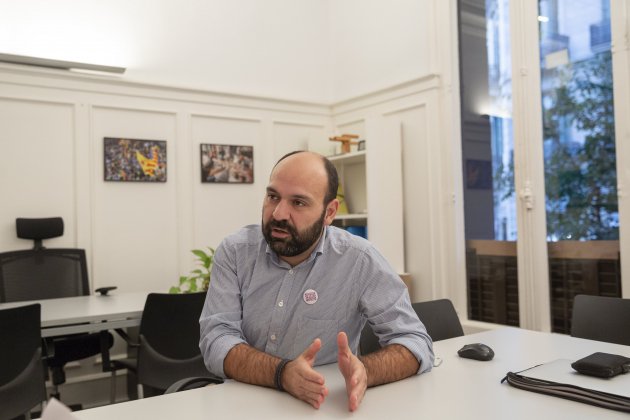
Could this "political solution" be a new autonomy statute for Catalonia and a new Spanish constitution, as the PSOE proposes?
To say that is to fail to understand this country and to try and position us where we were 15 years ago. And with the same dishonesties and deceptions as at that time. A good part of the country, in a spirit of good will, believed in that [autonomy statute], back then. But now we are in a very different scenario. Thinking that the people will accept a new statute, after the way the last one was crucified... It's a proposal that does not respond to the demands of the Catalan people.
Do you see a margin to negotiate anything with the current Spanish government?
With which Spanish government? With the one whose spokesperson says that the images of the referendum are fake news? That of foreign minister Borrell who uses the Spanish embassies to block any action abroad by the Catalan government? That of the vice president who says that a democratic government can't remove prisoners from prison - while, on the other hand, it can hold political prisoners? The government that gets the state solicitors to present accusations of sedition?
Hasn't there been any change?
They have been in government for almost half a year and they have said some very nice words and marketing operations, they have done that. But then, it turns out while they have photo opportunities with the [refugee rescue] ship Aquarius, they also continue immediate deportations of people who are looking for a decent future.
Is this appraisal of the Sánchez government compatible with backing a negotiated solution?
It is not with the Spanish government, but rather with the Spanish state, that something or other will have to be negotiated. What I have said is basic: negotiation will be needed, without any need to go into pros and cons. In a political conflict such as this one, is negotiation always desirable? Yes, it is, negotiation is preferable to police baton blows or prison.
How do you see the show that the pro-independence parties have put on in the Catalan Parliament?
In the first place, let's remember where this starts from: the state's repression. When you have a state that systematically dedicates itself to harming the rights of the citizenry, and even of the members of parliament, in order to damage their majorities... That's where we have to situate the start of the problem: the will of the state to decapitate leaderships, to divide parties...
It also starts with differences in strategy...
No. The origin is always the state's repression. Always. Without this repression we wouldn't have been through these other episodes. Without a judge, a judicial mechanism and a state which believes what people vote for can be altered, there would not have been these episodes in Parliament, I'm certain.
And not if the independence movement had responded in a united way, either...
I agree, but we can't put these two points at the same level. We can't put the repressors at the same level as the response by those who are repressed. It's obvious that if before the referendum this unity and shared strategy was already necessary, then with everything that has happened this year it is irresponsible that the independence movement does not have a unitary path. Because of that, we have Som el 80% and we will do all we have to do. But in spite of all the criticisms we can make ― and the independence movement has been very critical― there has been zero self-criticism from those irresponsible people who allowed article 155 to be imposed and an attempt to be made by the justice system to influence the results that came out of the ballot boxes.
From your contacts, can you see if this unitary strategy is being forged?
What is clear is that we don't have it yet and we want to have it. And we are working tirelessly to get it...
It is irresponsible that the pro-independence parties do not have a unitary strategy
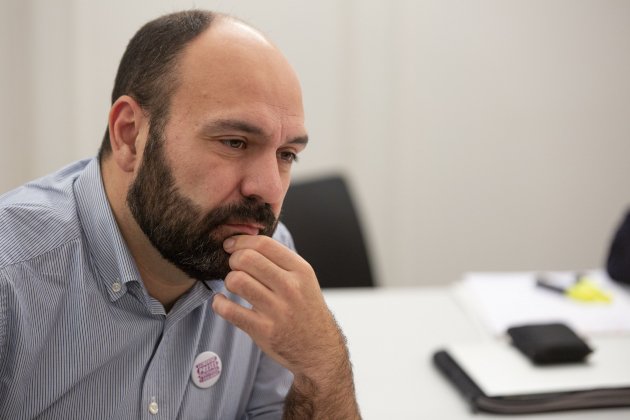
Do you agree with [Catalan minister] Elsa Artadi that the independence movement "doesn't have a majority to do everything"?
The minister was talking about the situation in Parliament. That is obvious. Precisely because there is a judge that has adulterated the parliamentary majorities, even though there were 70 pro-independence deputies and eight more who believe in Catalan sovereignty, Parliament doesn't have a majority for everything, depending on the specific question asked.
And beyond Parliament and Artadi, does it have a majority to do everything?
The independence movement has shown at the ballot boxes on several occasions that it is the only viable political project there is in our country. And at the same time, and in a broader way, the belief in Catalan sovereignty, all those who support Catalan self-determination, has shown very clearly that this majority exists.
But not in the way it had been approached until October last year.
What do you mean?
The unilateral path, for example.
This will depend on each party's strategies. It's not for us at Òmnium to say what the strategies or the road maps are. We do believe that, in the face of a state which is incapable of dialogue, which behaves violently, renouncing any peaceful and democratic path that could be used to attain our political objectives would not be very intelligent. Negotiation and reaching agreements are always desirable.
Do you support the ultimatum that the ANC made to the Catalan government, giving it until 21st December to set down a unitary strategy?
In the same way as we are respectful with the parties, we are even more so with our colleagues in the ANC, who we share many actions with. And we understand the ANC's positions, which express the feelings of a very important part of the independence movement. The formula which the ANC uses to express this demand, with ultimatums or not, we don't enter into that. But we do share a common background.
You were the first to ask the Spanish prosecutors to drop the charges, and they haven't done so. Is there still a margin for gestures?
The only possible gesture is acquittal. It is the only thing that we can hope for from the public prosecutors and especially from the state solicitors, which depend directly on the Spanish government. The public prosecutors do too: it must be remembered that the law allows the Spanish government to inform the public prosecutors that in cases of public interest they can modify their positions. It is not just that, in fact, it has always happened. We have seen it with this Whatsapp message leaked from the Partido Popular spokesperson in the Spanish senate. There is neither judicial independence, nor separation of powers, nor anything much at all. It doesn't exist in Spain; it's been destroyed. To defend the unity of Spain they are capable of destroying everything, even democracy itself. The regime of 1978 [year of the current constitution] is built on top of the Franco dictatorship's structures.
What are you refering to?
I am not saying that Spain is a Francoist state, but that it is true that there is a Francoist layer in many of the state structures. And this farce, this action of putting democracy on trial that they have set up, demonstrates that. It demonstrates how in the army, in some levels of the judicial hierarchy, there are these layers... In some cases it is not just a layer: the National Audience court is simply the heir to a Francoist court. The same people, the same formula, everything exactly the same. Spain didn't want to do it cleanly.
The referendum trial demonstrates the Francoist layer in many of the state structures, such as the judicial hierarchy
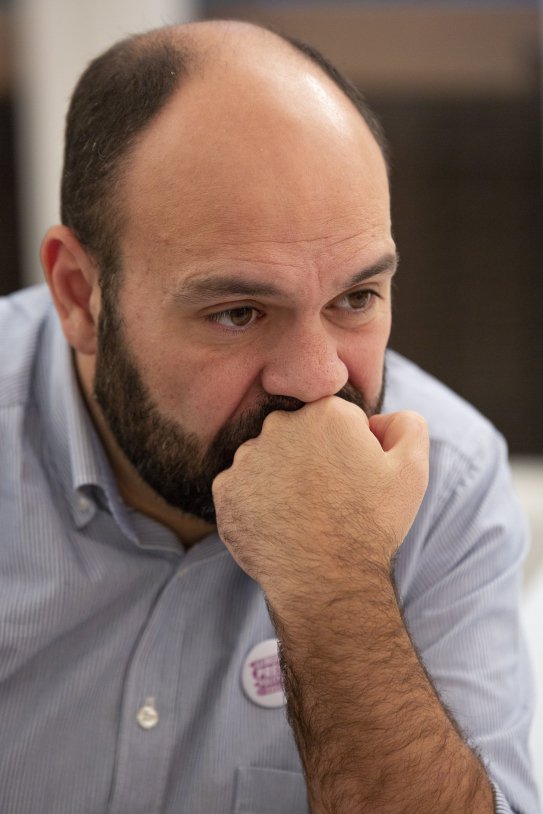
How are you approaching the trial?
The trial is going to try people for having defended rights and freedoms.
So, what do you expect?
From a judicial point of view, we expect the farce which we already know that they have constructed. The prosecutors who are in connivance with the state solicitors have asked for these outrageous sentences, which we have already seen rejected in Germany and Belgium. And working hand in hand with the extreme-right of the Vox party. These people will seat democrats in the dock. So this is the first round of a trial for which we will win the second round in Strasbourg.
And from a political point of view?
Even though they already have the sentence composed and thought out, it will make it very hard for the Spanish state, politically and socially.
And do you expect anything from the international community?
It depends. If you talk about the European Union, which doesn't even blush when people are dying in the Mediterranean, we don't expect anything. But from the institutions, the parliaments, MPs, ministers, NGOs and many European citizens, we expect a lot. Also, in so far as we have the ability to speak up in Europe. Because of that Òmnium has opened an office in Brussels and in the coming weeks we will start an international campaign. We also appeal to the rest of the peoples of the Spanish state, to mobilize for their rights as people did on 1st October. Mobilizing against the referendum trial is also mobilizing for their own rights.
There has been a lot of speculation about the response to hypothetical guilty verdicts... what should it be?
We will have to construct the response...
You have told me that the sentence is practically already written. In that case, I imagine that people are already talking about the response...
Obviously people are thinking. At the right moment there will be explanations. But that's not just up to one group. There are many agents involved. From spaces like Som el 80%, to our colleagues in the ANC, the political parties that have people facing state reprisals, the institutions. As for the 1st October, it is a combination of the public, the institutions, the parties and the civil groups, which was a success. It has to be good enough to confront the most serious attack that we will have ever received in the democratic era.
Is the pardoning of the accused an option if the state does not fully retreat?
For ourselves, speaking only in the name of Jordi Cuixart, everything that consists of accepting that a crime was committed, we won't consider it, because he hasn't committed any crime. He was defending rights and freedoms. That's what he did and he would do it again.
Not even in the very difficult personal situation of prison with sentences that could be very heavy?
For 17 years of prison, we will not abandon our principles, to want to defend democracy and freedoms. If anybody thinks that through repression and prison, they will will get us to limit our legitimate projects, of deciding the collective future at the ballot box, then they don't know us. They don't know Jordi Cuixart. Jordi has already said that he won't go to court to defend himself from anything, because he hasn't committed any crime. We won't join in with this farce. He'll go there to accuse the state of destroying fundamental freedoms.
Cuixart won't consider a pardon; for 17 years in prison, he won't abandon his principles
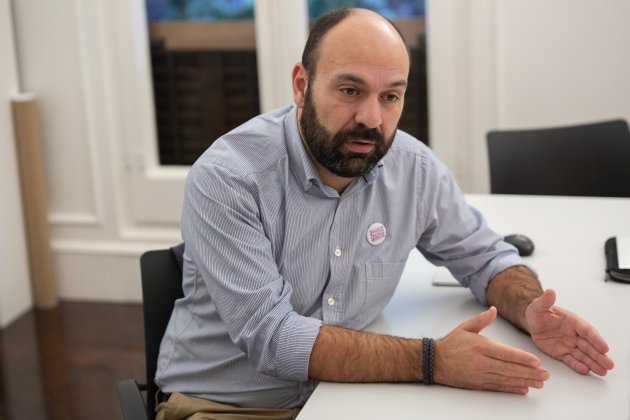
What do you think when you see, day and night, political leaders saying the political prisoners are treated with privileges?
That they are people without any scruples, who only want to generate headlines to win elections in Andalusia. That the welfare of the people of this country does not interest them in the least. Not even that of the people of Andalusia. They simply want their share of screen time. If by privileges, you mean that, in return for cleaning some toilets, they give you one more day of visiting time with your children, then yes, Cuixart has privileges. Because he cleans the toilets and does so with the dignity of a political prisoner. Those that talk about privileges won't be able to look Cuixart in the face for ten seconds on the day that he gets out of prison.
How does Òmnium see the local elections?
A key moment. They will be very important. The municipal councils are the first line of attention to the public. We are in a country where 23% of people are on the threshold of poverty, where there are severe social problems, which are the things that cause fracture. Moreover, we don't have the ability to legislate. In a country where there are 13,000 evictions a year, the councils end up being the first line of defence.
And from a national viewpoint?
From a national viewpoint they are enormously important elections, because they will lead to the election of local councils that will show whether the parties that support self-determination, those opposed to prison, are in the majority. I am convinced that they are.
I imagine that Òmnium doesn't take a stand on the proposal for unitary [pro-independence] lists in the municipal elections. But in the European elections is it different, taking into account the mouthpiece that Brussels can allow?
As you said, Òmnium never makes pronouncements about the formula that the parties have to use in elections. That's up to them. We don't enter into the short-term details of politics. We only ask that they establish consensus and find the way to maximize votes.
Isn't the case of the European elections a different scenario?
They are very important, precisely because of the current state of Europe, the rise of populism and the extreme right. And it is very important that there is a Catalan voice that denounces the violations of fundamental rights. But the rest depends on the parties.
From some sectors there has been a lot of criticism of what was called the Estat Major - the "chief of staff" of the independence process. What role did the civil groups have in what happened a year ago?
I don't know who criticized it...
[Former Catalan minister] Santi Vila, for example.
The role of Òmnium, which is what I can talk about, was that of working so that what the government had promised it would do, which was to hold a referendum, was carried out in practice. And we worked as hard as we could so that Catalans were able to decide at the ballot box. With the consequences that that has had for the organisation, and for Jordi especially.
Those that talk about privileges won't be able to look Cuixart in the face for ten seconds on the day that he gets out of prison.
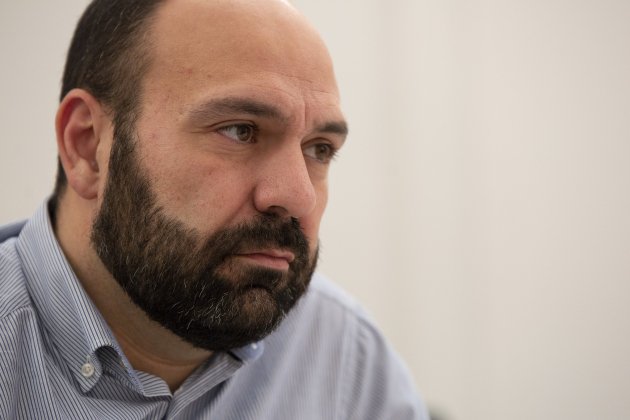
Is the mandate of the 1st October referendum result still valid?
It is a day that has changed everything. It is the most important exercise of popular empowerment, non-violent civil disobedience and self-determination that we have been through in decades. We can't renounce that and nor do we want to.
But the mandate from the ballot boxes that day?
It is evident that 1st October led to a 10th October [day of independence declaration, immediately suspended] and a 27th October [day of lifting of the suspension] with parliamentary consequences and that there wasn't the capacity, for whatever reason, to materialize those. In a scenario of normality, without people in prison and exile, I'm sure that it would be possible to analyze all this much more calmly. But it is a debate that we can't postpone. Not so much to search for people responsible, but because of the challenges pending.
But is the result of the October 1st vote still valid for the implementation of a republic, or has it been superceded by events?
On this question, among the different pro-independence parties it is evident that there are different positions. And at Òmnium we appeal for a serene debate that places the various viewpoints on the table and allows us to find the path to follow. For us, it is evident that 1st October has changed everything, it has generated republican complicities like never before, even though it is also evident that there is a significant part of the public which does not consider the referendum legitimate. That also expressed itself at the ballot boxes on 21st December [in the Catalan elections].
And so?
For us, the mandate of 1st October is such an important political mandate that it almost overshadows the debate on whether there was a binding mandate or not. The 1st October has changed the way of understanding the country, and the relationship with the state. It is a day that culminated a work of many years of struggle for the right to decide, and a day on which the state's repression explodes. Therefore, we can't renounce what 1st October represents.
When people talk about exercising self-determination again, do they talk about reaching a scenario where all of the public considers it legitimate?
What we support is that it's necessary to construct this new strategy that makes it possible for all that 1st October signifies to be translated into a real political application. And yes, obviously, we always, always aspire to the maximum legitimacy of collective political decisions.
Is that what is called, maybe in a slightly ridiculous way, "broadening the base"?
We never talk about broadening the base... Broadening the base implies that there are people who broaden and others who are broadened. We say that we want to share the only viable project ―an independent republic― with the alliances of 1st October and those of 3rd October [the day of national stoppage in Catalonia]. And we want to do this, going against the maxim used by [former Spanish PM] Aznar, that Catalonia would be divided before the unity of Spain would ever be broken.
...
If the parties that have a majority in the Catalan Parliament tell us that they have a firm proposal, and that they are capable of implementing the Republic in a rigorous way, Òmnium will always stand beside those decisions that have a consensus. We only demand an approach based on unity and rigour.

